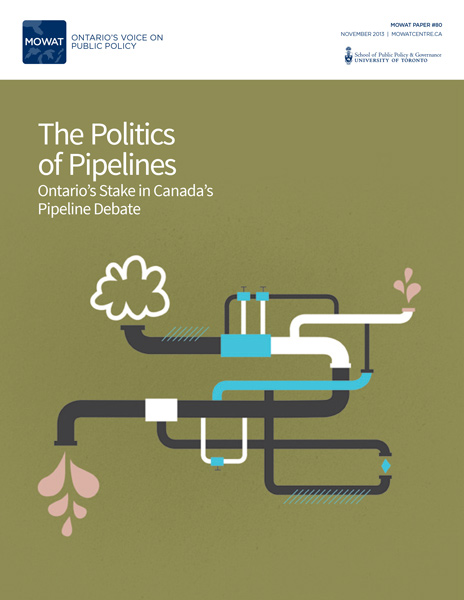November 10, 2013
Ontario’s Stake in Canada’s Pipeline Debate
This paper analyzes the political and economic context of pipeline development in Canada and outlines Ontario’s stake in the national debate. Laying out the main areas of consideration for the province, including the potential economic benefits to First Nations, local communities and provinces, it also highlights the risks to the environment and to Ontario energy consumers. The paper argues that the most realistic and reasonable way for many Canadians to support pipelines, and the resulting expansion of oil sands production in Alberta, is within the context of a federal price on carbon emissions.
Executive Summary
The politics of pipelines in Canada is intensifying. No fewer than six major crude oil pipeline projects are currently being planned or considered to ship oil across the country. In addition, there are proposed gas pipeline projects to transport natural gas to the British Columbia coast for export.
But it is crude oil pipelines–particularly pipelines transporting production from the oil sands–that have become flashpoints. Environmental groups and energy companies have staked out clear positions, as have political parties and First Nations communities. Many provinces have made their positions clear and the Canadian Prime Minister has publicly stated he will not take “no” for an answer if the US refuses to approve the Keystone XL crude oil pipeline. The Ontario government has recently announced that it is supportive of pipeline construction generally, stating it to be in the national interest. More detail about the nature of that support has yet to emerge.
Ontario’s position in this debate is inevitably more complicated than that of other provinces. New Brunswick and Alberta, for example, have very clear economic interests in the successful completion of the Energy East pipeline. BC has outlined its position in detail, which involves weighing the economic and environmental risks and rewards of pipeline projects and has recently signed a framework agreement with Alberta. Saskatchewan and Quebec have likewise articulated clear positions on major pipeline projects, in line with their economic interests.
Ontario’s interests are more complicated.
Ontario is in general supportive of economic development in New Brunswick and of Alberta’s continued prosperity and is thus inclined to support new pipelines. But Ontario also has a strong commitment to reduce the emissions which contribute to climate change. For nearly a decade, Ontario has confronted a federal government that refuses to recognize the contribution that Ontarians are making to reducing emissions while allowing the emissions from the oil sands to continue increasing unabated. So long as the federal government–and the government of Alberta–support a climate change policy that asks Ontarians–and other Canadians–to carry the largest burden and pay the biggest financial cost for reducing emissions, there are good reasons for Ontario to oppose pipeline development that will only exacerbate climate change.
Continue Reading
Canada’s financial sector, headquartered in Toronto, has large investment interests in the development of the oil sands and the successful completion of pipeline projects. Many companies that sell goods to the oil sector have an interest. So do many high tech firms that could undertake the research and development of new technologies that would strengthen Ontario’s economy, provide services like pipeline management or environmental remediation, and would be part of a sophisticated pan-Canadian energy strategy.
Consumers likely also have an interest, as various pipeline projects will impact the price Ontarians pay for energy. First Nations and municipalities that expect to be hosts to pipelines will want to see their interests protected–both economically and environmentally–as it is these communities that will take on risk from accidents.
Authors
Matthew Mendelsohn
Richard Carlson
Release Date
November 10, 2013
ISBN
978-1-927350-64-5
Mowat Publication
No. 76








